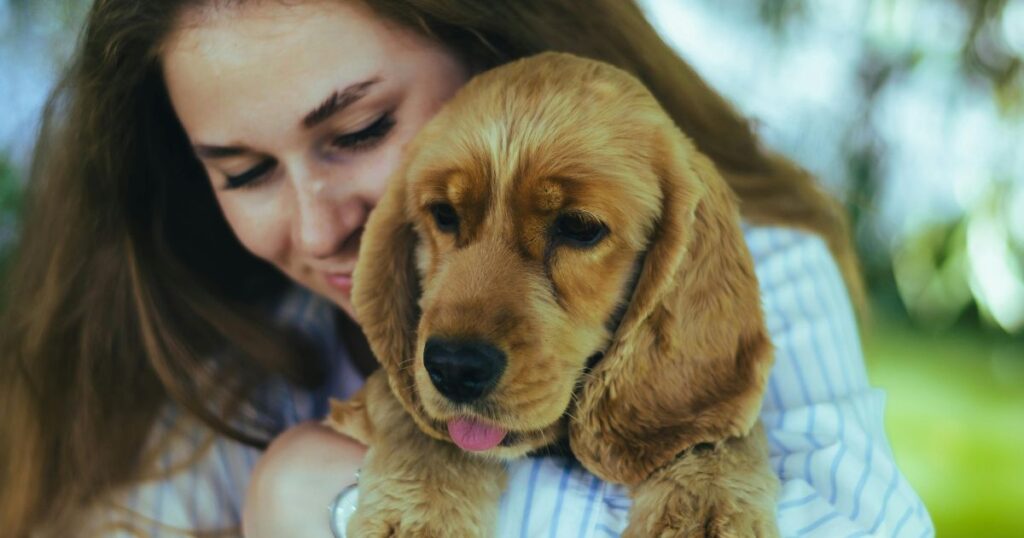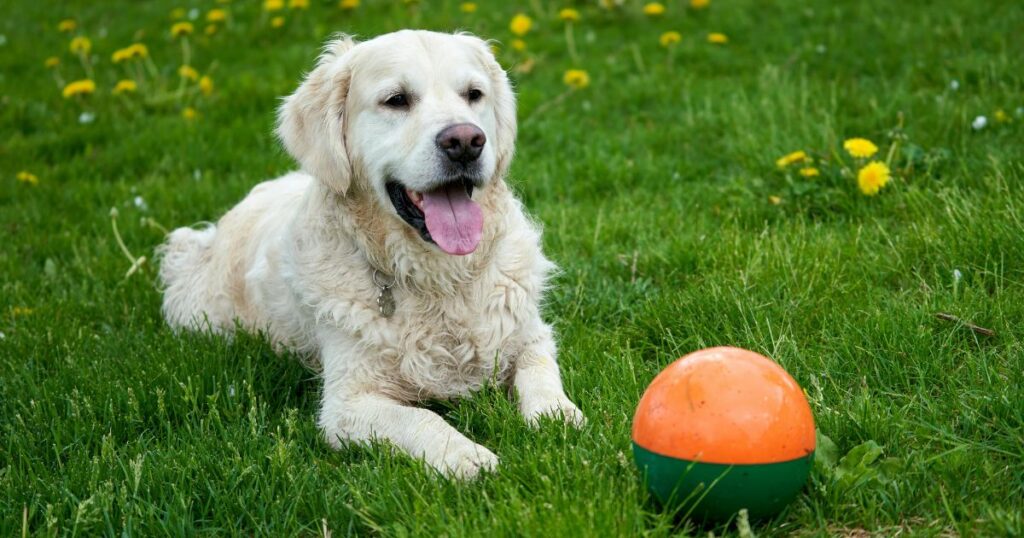As an Amazon Associate, I earn from qualifying purchases
Puppy Whining: Puppies whine for the most part simply because it is a natural means of communication: they are feeling anxious, calling out to see if someone will pay attention to them (you know, pick me up so I believe you love and adore me), or just frightened at being in their new surroundings.
The easiest-to-understand solution for addressing whining… you guessed it, is: getting your butt up and taking them outside the SECOND they start whimpering.
Today, I will be discussing when your puppy may whine in some common situations and how long that kind of whining tendency should last.

Crate Training
A pivotal training process for many new puppy owners, crate lessons often bring their own sets of challenges, like whining. New crate-whining puppies can occur for several reasons, like feeling trapped, and alone without their people.
Thus, it is quite normal to create a new place and the puppy can feel like he’s alone there. Many puppies, will however transgress to a 1-3 week period but only the utmost on patients/hardships.
This will create a comfortable space for them, but to put their mind at ease about this new confined living arrangement, filling the crate with soft bedding and its favorite toys as well as your smell.
The important thing is not to let your puppy out every time they whine — this can reinforce the behavior and make their adjustment period that much longer.
Crate training is one of those things that can be a very positive experience if done correctly, but consistency and limits are also both really important.
Puppy Whining
Being Left Alone
Puppies are naturally social, and being abandoned can cause serious anguish over large periods which may lead to never-ending whining. Normally, this starts from separation anxiety as puppies tend to become panicky when they are forced apart from their owners.
The time required for your puppy to quit whimpering when left alone can differ. For some puppies, this can take only after a couple of days while in other cases it could be anything between weeks to even up to a month till he fully adjusts. To make this new stage a little easier, you have to start by leaving your puppy alone for shorter periods and then increase the duration as they get used to it.
This is where the use of a blanket or something that smells like you might come in handy. Good boy — and when you come back reward this calm behavior to help him remember that being alone isn’t a scary idea.
Nighttime Whining
Puppies may whine at night due to a variety of reasons, such as feeling lonely, needing to go to the bathroom, or being anxious about their unfamiliar surroundings.
Most puppies stop whining during the night within 1 to 3 weeks as they settle into a sleep routine and become more comfortable with their new home.
To help minimize nighttime whining, it’s important to establish a consistent bedtime routine. Ensure your puppy has had a bathroom break before bed and consider placing their crate near your bed initially, so they can feel reassured by your presence.
Over time, as they become more confident, you can gradually move the crate to a different location. Patience and consistency are key, as puppies will eventually learn to feel secure and sleep through the night without whining.
Meeting New People or Dogs
Lots of excitement or some social anxiety in puppies can make them whine when meeting new people or dogs. With these new faces to meet, they get used to the different smells and sounds. The amount of time a puppy whines during social times varies from their temperament to how much they are exposed to new things or the lack thereof.
Most puppies, if regularly socialized will eventually stop whining within a few weeks to maybe even two months. And to have them meet new people and dogs little by little until they get used to these interactions.
Practicing these encounters can help your dog learn that if they stay calm, good things will happen in return (i.e. treats and praise) when meeting new people or dogs.
Car Rides or Travel

Taking Puppies on Car Rides or Travel New puppies experience changes in their lives every day; some are exciting, while others may be stressful. The puppies whine during car rides because they will be new to the vehicle (they learn new ascribing), in an unknown environment, and – even worse -it is moving.
A lot of people feel anxiety because they are out of their past surroundings or because traveling is not something familiar to them and that makes sense. Many puppies eventually come to enjoy riding in the car with lots of positive exposure and associations. Creating familiarity with items like blankets, toys, or a crate can make the journey less anxious for them.
When encouraging a puppy to learn how to ride in the car, make sure that you first start with short trips every day before going on long days out. The pup needs to get used to the shaky movement of a car and sound. Gradual exposure will help him suffer less from it when he gets older/more conditioned.
Furthermore, by simply making the experience pleasurable — offering a treat or praise afterward and even ending every ride at an enjoyable location such as the park or with something they love to do after going for a drive you can easily turn car rides into something that is looked forward too instead of fear.
In some cases, puppies will need doses for motion sickness prevention as well so it is important to observe signs of discomfort and talk with your vet if needed.
Whining Due to Fear or Stress
Just as we humans sometimes get insecure in something new, loud noises, or when meeting other humans and animals. Whine — When the puppy makes a loud noise it is often whining and can happen as their way to communicate that they are threatened, insecure, or uncomfortable.
These triggers often come from things like thunderstorms, fireworks, vet visits, or being in new social situations. We need to understand and look out for these symptoms in time — tackle the fear from its roots so that a puppy feels protected and breathes easily.
Reducing fear-related whining should be done with patience and slowly. Using the method of desensitization, giving your puppy a little exposure to whatever he/she is afraid of using in a well-controlled low-stress environment can be very effective.
Such exposures are paired with positive reinforcement (treats and praise) to help the puppy start to associate what it is fearing with something good. Offering a safe space like for example their crate or even just a quiet room can give them security during these situations.
Consistency and Patience in Reducing Whining
The solution to most of the growing-up in puppies stop whining is all about consistency and patience. Whining comes naturally for some dogs, and they also were born this way. Puppies whine to communicate they need your help or are uncomfortable with something, and you want to be as consistent in how you respond to their cries whenever possible.
When you respond the same way every time, by avoiding stopping feeding or generally ignoring attention-seeking whining, and then rewarding calm behavior with praise. your pup will learn what causes these behaviors to either be set aside as not successful at getting them more food ( barking for example) or if staying quiet / sitting earns rewards.
The reality is that training takes time and you will not see immediate changes so make sure to give your puppy enough patience for him or her to understand how things are done.
Before you harshly criticize your bully dog again for misbehaving, be patient and remember that consistent ongoing training can save frustration on both parts.
But giving in to whining is a no-no because ambiguous responses can confuse the puppy and prolong its irritating habits. Instead, reward peaceful actions with things like treats or toys, etc.
Tips to Soothe Your Puppy at Night
- Establish a comfortable sleeping space. Make it warm and cozy.
- Stick to a bedtime routine. Just like for kids, routines help.
- Keep the puppy close. The first few nights, keep your puppy near.
- Respond, but don’t overdo it. Let them know you’re there but without fuss.
- Use calming aids. Consider a heartbeat toy or soft music.
Dealing with Persistent Crying
Some puppies cry more than others. It’s perfectly normal. Here’s what you can do:
- Check for health issues. Visit the vet to be sure.
- Consider professional training. It helps in some cases.
- Patience is crucial. They will settle in time.

Frequently Asked Questions For How Long For Your Pup To Halt Nocturnal Whimpers
How Quickly Can Puppies Adapt At Night?
Puppies typically adapt to night-time routines within a few weeks, particularly if they receive consistent training and comfort.
Do Puppies Cry Less Each Night?
With proper training and settling in, puppies usually cry less each night as they grow accustomed to their environment.
What Soothes A Crying Puppy At Night?
Soothing a crying puppy can be achieved with a warm blanket, a ticking clock for simulated heartbeats, or a soft toy to cuddle.
Can Feeding Schedules Affect Nighttime Crying?
Yes, a consistent feeding schedule helps regulate a puppy’s body clock, potentially reducing nighttime crying.
Conclusion
A puppy will stop whining at different paces depending on the specific environment, situation, and of course individual dog. Depending on the breed, temperament, and past experiences play a part in how fast your puppy will be more adaptable versus still whining.
Roughly translated, whether you are crate training your dog to not whine when it is shut in its room of safety or helping the puppy learn how and why staying with his cool owner will show him that he has nothing to worry about, all advice leads steadily towards traditional dog-training methods one way or another.
This takes time (and a lot of effort!) but usually, most pups do settle in and learn that they can communicate more quietly/ appropriately as they get older and are more comfortable in their new home.
As an Amazon Associate, I earn from qualifying purchases

